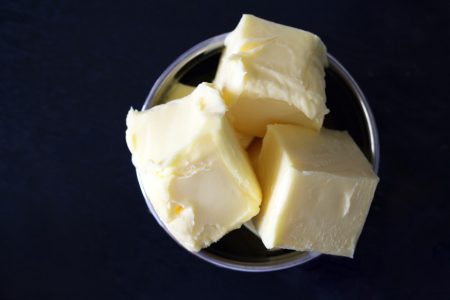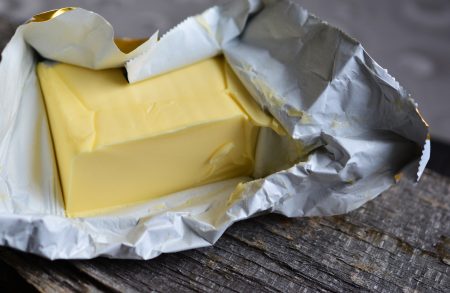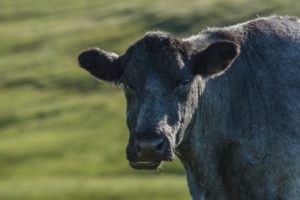Eat This Type of Butter
Remember the days of margarine and the thought of eating butter was just wrong and so unhealthy?
Remember thinking eating fat makes you fat?
How times have changed!
Butter should not be demonized but the TYPE of butter matters.
I see many still skipping butter and using plant- based spreads instead. These spreads have all the marketing on the label to make you think that it is a healthy product but typically these are refined oil based or refined soy- based products which can contribute to systemic inflammation. If you can tolerate butter, I suggest switching from your plant-based spread to grass fed butter.
Yes, grass fed butter-and it matters!
Why You Need Good Fats in the Diet
- A source of energy!
- Building blocks for cell membranes
- Nerve insulation
- Regulates body temperature
- Carrier of fat- soluble nutrients
- Precursor to your steroid hormones
- Fat is 60% of your brain!
Get These Thoughts Out of Your Head if You Are You Still Fat Phobic
- ALL fats are bad for me
- CVD and high cholesterol are caused by eating fats
- Hydrogenated fats keep food fresh longer and therefore must be healthy
- I need to avoid fats if I want to lose weight
Butter and Cooking
Butter is made up of short chain fatty acids (SCFA). Butter is a fat that those who had their gallbladder removed can still consume because bile is not required to the digestion of SCFA’s.
If you are going to cook with butter, it has a smoke point of 250 F. Ghee can be used at cooking temperatures up to 485 F. and thus a better option for cooking.
Quality Butter can protect against atherosclerosis when combined with a healthy diet, not the other way around!
I Have a Dairy Sensitivity, Can I Eat Butter?
The answer is maybe but more than likely.
Many who have a food sensitivity to casein or whey can still consume butter and ghee. This is because you are sensitive to the proteins in butter not the fats and butter contains very little protein since it is mostly fat. Ghee will contain even less protein as the protein layer is removed during a process at low heat to make the final product. Ghee does not have to be stored in the fridge although since most people think it needs to be most health food stores will carry ghee in the refrigerated section of the store. If you are opting for ghee over butter, still make sure that it says it is from grass fed cows.
Why Should I Use Grass Fed Butter?
I see so many people still fearing fat! There are some fats you should avoid such as rancid oils such as corn, soy, hydrogenated oil and vegetable oil but there are also many good for you fats such as from flax seed, grass fed butter, nuts, other seeds and avocado.
Your grandparents grew up using butter, lard and beef tallow for cooking instead of the refined oxidized oils we use commonly today. We have more CVD now than ever before, so I don’t think your heart disease and obesity is related to the butter in your diet but instead the sugar and processed foods.
“No diet will remove all the fat from your body because your brain is entirely fat. Without a brain you might look good but all you could do is run for public office” ~ George Bernard Shaw
Grass Fed Butter Benefits VS Non-Grass Fed Butter
- CLA (conjugated linoleic acid): it has 5 times the amount of it compared to non -grass fed butter. This matters because CLA is a fatty acid that is anti-inflammatory and protective against cancer and helps your body to build muscle over fat (hence the reason for all the CLA supplements in weight loss sections of stores). CLA is also heart protective and studies suggest that those who have higher CLA levels in the body have lower heart attack risk.
- Vitamin K2: There is K1 which is found in plants and K2 from meat sources such as butter. K2 is needed for heart health and bone health because it regulates calcium levels in the blood. Think of K2 as the taxi driver to get vitamin D and vitamin A to the bones. Your gut can also make K2 from K1 which is fascinating. The same happens when cows eat plants (hence why your butter must be grass fed). When they consume plants rich in K1 they convert it to K2 which is found in their milk and butter. If the cows are kept inside and fed a diet of GMO inflammatory corn which is unnatural for them, there is no K1 to convert into K2.
- Omega 3 Fatty Acids: It will have more DHA and EPA than found in non-grass- fed butter. One analysis found that grass fed butter has about 26% more omega 3’s than regular butter.
- Butyrate: Grass fed butter contains butyrate which is a short chain fatty acid that has numerous benefits-see the section below on butyrate .
- Vitamins A, D, E and Beta-Carotene: Grass fed butter is rich in these nutrients
Butter and Butyrate and The Amazing Benefits
Butyrate found in butter is a SCFA. SCFA are also called post biotics. (you have prebiotics, probiotics and post biotics as part of your microbiome).
Butyrate benefits include energy source for the colon cells, has anticancer effects, increases mitochondrial activity, prevents toxins from crossing gut barrier, improves insulin sensitivity and increases the synthesis of leptin (reduces hunger). SCFA are also found in banana, grains, onions, and beans.
Butyrate can be helpful against depression and anxiety and mania
Butyrate may be the most important of these SCFA because
- It raises your metabolic rate (you burn more calories)
- Is reduces inflammation and boosts your resistance to stress
- Butyrate is the preferred source of energy for the cells that line your colon.
- Butyrate food sources: butter, grass fed is best food source, otherwise eat foods that stimulate butyrate production (inulin food sources-chicory root, garlic, onion, leeks, asparagus), whole non gluten grains, legumes, FOS foods-banana, garlic, onion, nuts especially pistachios and almonds
- In the case of the other foods mentioned above, butyrate is produced by fermenting the fiber from the above foods
Grass Fed Butter Brands
I used to buy Kerry Gold butter which is from cows in Ireland but about a year or two ago it was found that the Kerry Gold Brand may be not telling the truth and in fact their cows are not raised on pastures and not consuming a grass fed diet. Since I don’t have all the facts, I have chosen to not purchase this brand any longer. If you are set on this brand, I encourage you to do some research first.
Some other good brands to consider include
- Achor (New Zealand)
- Allgau (Germany)
- Smjor (Iceland)
- Local in the US: Organic Valley Pasture Butter (produced May to September), Kalona Grass Fed and Horizon Grass Fed
Bottom Line
Do not fear butter but choose the right type of butter for cooking and enjoying in your meals.
Sources
Bauman, E. & Friedlander, J. (2015) Foundations in Nutrition. CA: Bauman College
Wood, R. (2010) The New Whole Foods Encyclopedia. USA: Penguin Books
https://www.vitalchoice.com/article/paleo-diet-rule-meets-resistance?
https://www.betternutrition.com/ask-the-nutritionist/4-health-benfits-of-grass-fed-butter







Leave A Comment
You must be logged in to post a comment.